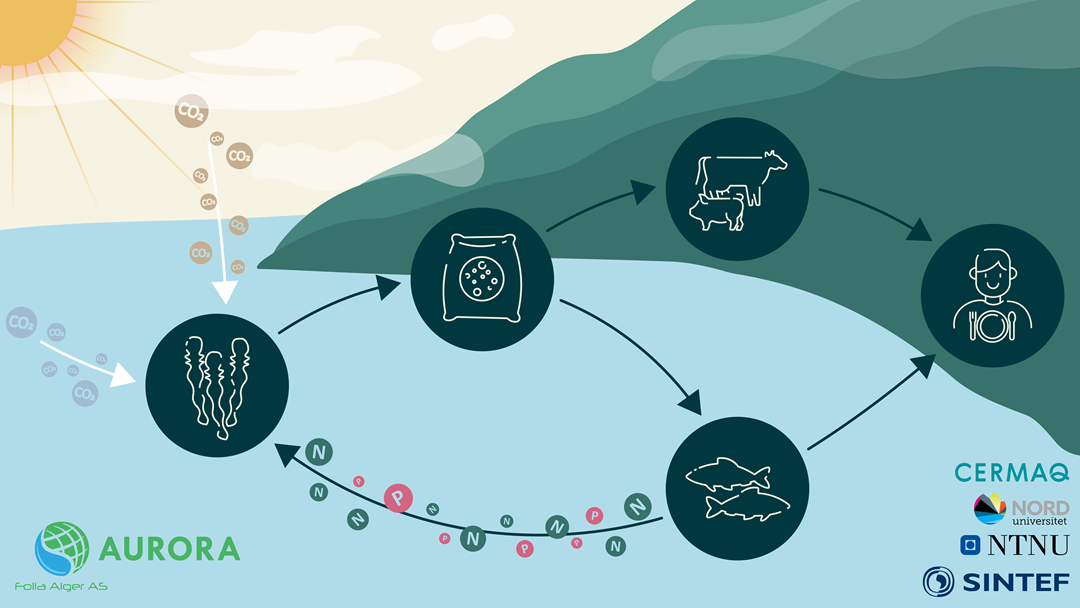AURORA IMTA (Integrated Multi Trophic Aquaculture) will bring new knowledge to help develop an industrial solution for integrated aquaculture that combines salmon and kelp. In addition, the project will test the IMTA effect in Northern Norway.
The Norwegian aquaculture industry uses 1.5 million tonnes of feed to produce 1.3 million tonnes of salmon every year[1]. In order to realise further growth, it is important to improve resource utilisation of valuable feed ingredients. Today, more than half of the nutrients present in fish feed are lost to the surrounding marine environment. Therefore, it is good use of resources to utilise the nutrient salts from salmon farming in the cultivation of kelp.
The project’s first pilot phase aims to; (i) test and optimise sea-based facilities, (ii) map the kelp cultivation potential of the site, (iii) establish a mathematical locality model for visualisation of IMTA effects and (iv) conduct basic studies on fish health prior to the demonstration of industrial IMTA in phase 2 DEMO. In order to optimise the sea-based facilities with the integrated mooring of salmon net-pens and kelp modules, it is a sub-goal to develop a load model for kelp based on measurements of forces and environmental impacts in and on the kelp modules, and connect this model with existing simulation tools for aquaculture structures.

It is also a sub-goal to compare field study measurement data for physical, biological and chemical conditions at the IMTA facility with model simulations in order to verify the site model and use this to evaluate the concept, scale up the production scenarios and suggest potential positive and negative links between kelp facilities, fish and the surrounding environment. It is also a sub-goal to quantify discharges of nutrient salts from fish and their uptake in kelp, and to see this in relation to simulated natural access to nutrient salts and natural primary production (phytoplankton) in the area around the IMTA facility. This can then be used as a basis for establishing ecosystem-based operation and management of the IMTA facility.
Folla Alger and Cermaq installed a fully integrated sea-based facility for the co-production of salmon and kelp at the Nordfoldleira site in Steigen during the spring of 2022. Two transfers of fish and one transfer of kelp were made. The prototype facility has been continuously improved throughout the year and now consists of eight net-pens for salmon, and 4 large kelp frames in an adapted frame mooring. The salmon net-pens are placed in two groups of four sections at each end of the facility, while the kelp frames are placed between the two groups of salmon net-pens.
SINMOD simulations show that the kelp facility will not negatively affect the oxygen saturation in and around the salmon facility to any great extent, and that the allocated salmon biomass will be large enough to make a measurable contribution of nutrient salts. The kelp transfer was conducted through the release of spores from mother plants of local origin, and gametophyte cultures have been initiated that are being scaled up for future transfer. The kelp that has been transferred will grow to harvestable size in 2023. Samples have been taken of kelp and salmon to see if the species affect each other’s microbiota, which will later be expanded to include the effect of feed containing kelp ingredients on salmon in the facility. All fish groups have experienced good growth and normal feed consumption. Welfare scores generally showed no or low numbers of lice, good gills and an absence of back deformity. Some fin wear was observed, but fish welfare was generally good. The project has established a good basis for following any further IMTA effects on kelp and salmon.
[1] Ytrestøyl T, Aas TS, Åsgård T. 2015. Utilisation of feed resources in production of Atlantic salmon (Salmo salar) in Norway. Aquaculture 448, 365-374.
